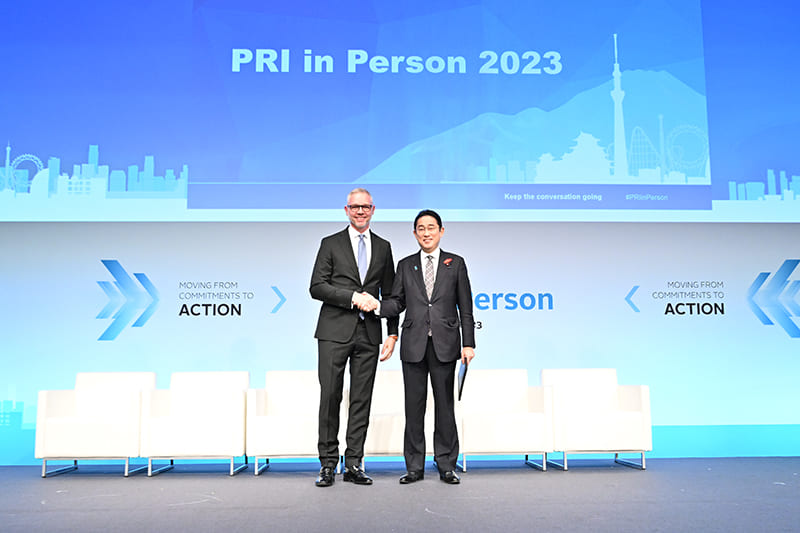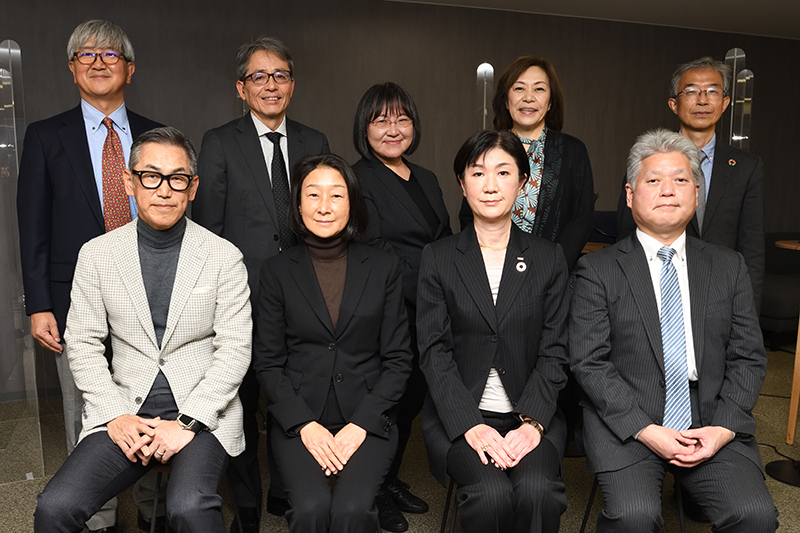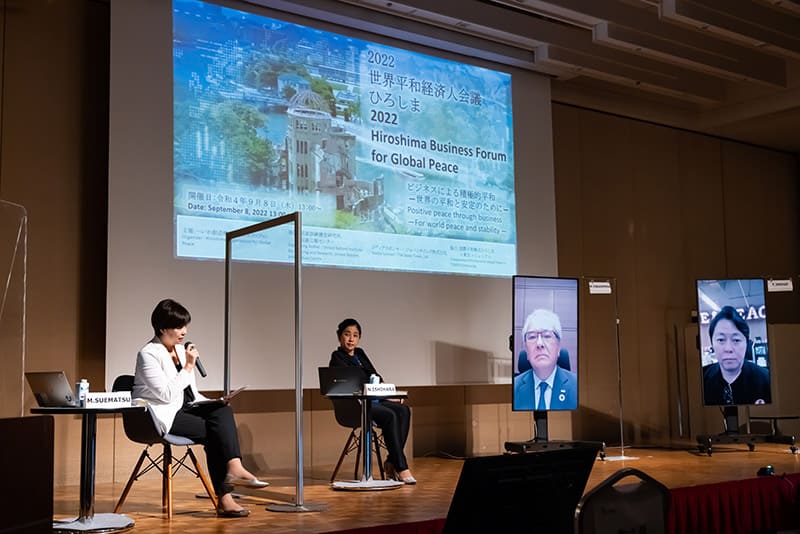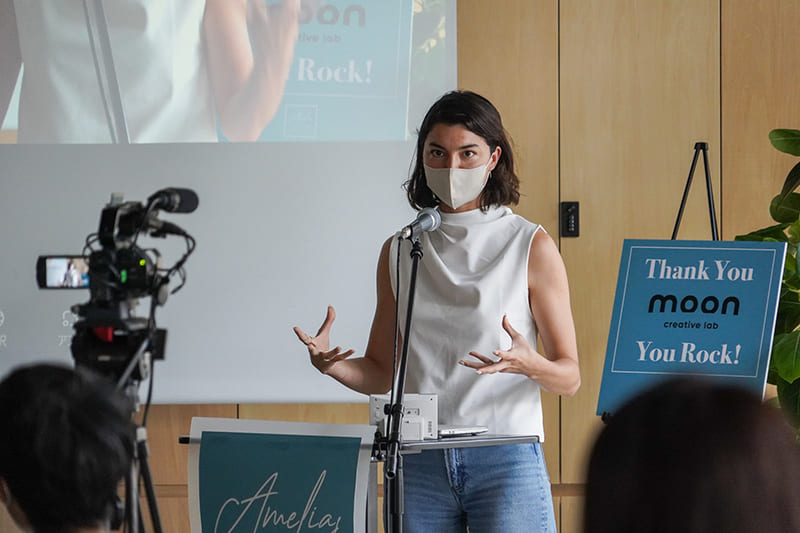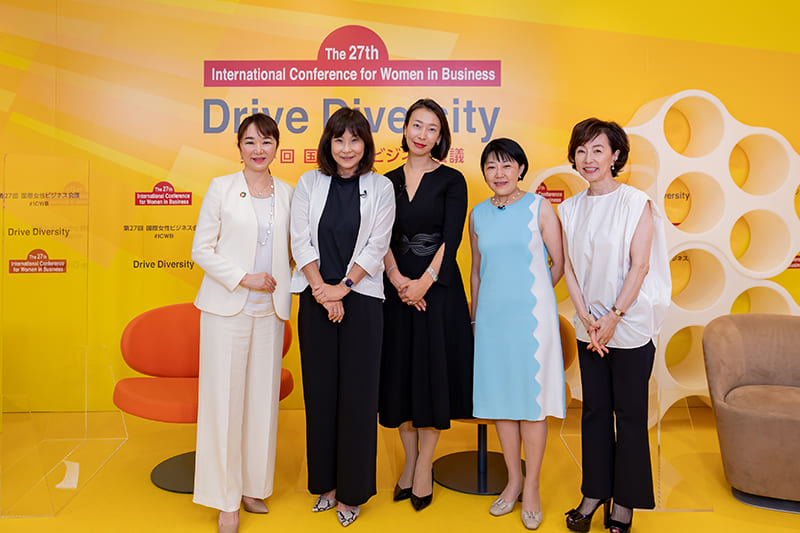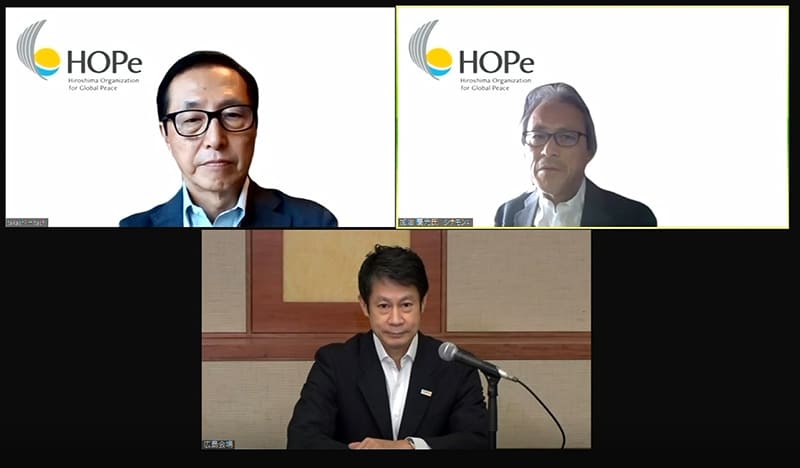July 28, 2023
Businesswomen challenge selves at ICWB conference
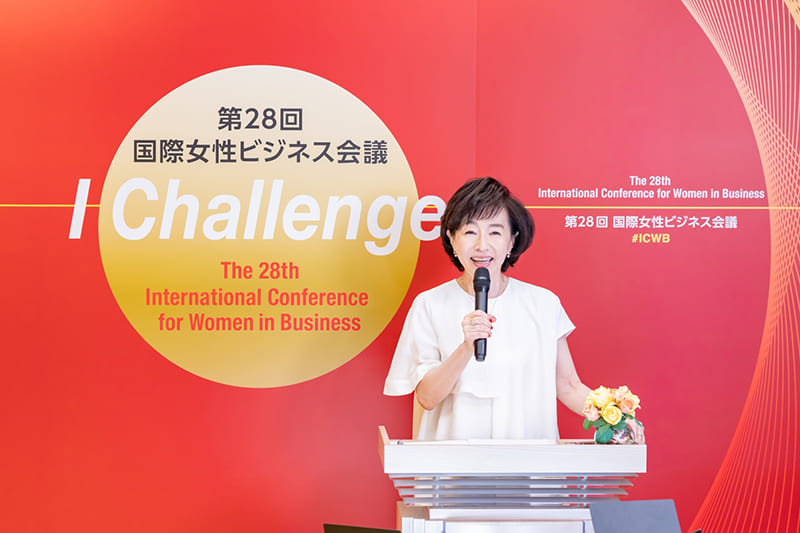
On the morning of July 9, more than 1,000 people from around the world gathered online for the International Conference for Women in Business (ICWB). Male participation at this annual event was a record-high 25%. Kaori Sasaki, founder and CEO of diversity consultancy Ewoman Inc. and communications consultancy Unicul International Inc., created the ICWB originally for working women to connect and learn from each other. Now in its 28th year, the ICWB is one of the largest annual diversity conferences in Japan.
The conference has been held every year, even when the COVID-19 pandemic hit the nation. The 25th, 26th and 27th ICWBs were held entirely online, offering participants the same excitement and insights.
This year, for the first time, the conference is divided into two parts: the 10-hour online conference in July, followed by a face-to-face get-together to be held in August. Both feature simultaneous interpretation in English, with experts in various fields invited from around the world to share their knowledge and experience to help participants broaden their perspectives and take on new challenges.
Personal challenges
The conference is given a different theme every year, and this year’s is “I Challenge,” as in “I challenge myself to —.” Sasaki started the event by saying that the theme deliberately is not a complete sentence. “I hope every one of you will be able to find a word that completes your sentence and be aware of what you want to achieve,” she said, adding that she wanted everyone to “focus on how one can contribute to society” by thinking about ways to grow and engage with other people in order to make an impact in the era of diversity.
Sasaki said people tend to expect big organizations like governments and companies to create new frameworks to bring about change. “But to make the frameworks function as they should, it is important that each one of us has the attitude and know-how to communicate and contribute our own experiences and perspectives within the frameworks,” she said.
With this clear shared purpose in mind, the morning session started with a speech by Keiko Honda that was especially inspiring for youths. She serves as an adjunct professor at Columbia University’s School of International and Public Affairs and as a board member at several companies. In her earlier career, she was the first female senior partner in Asia at McKinsey & Co. before she was appointed as the CEO of the Multilateral Investment Guarantee Agency, part of the World Bank Group.
She spoke about how she shaped her career based more on her assessment of what needed to be done and what skills she needed to acquire to meet those needs, rather than merely on what she could do or wanted to do. Learning has always been part of every stage of her career. “I have been studying various things such as the background of the Japanese corporate governance code, which may be useful for my job as an outside director, since I was appointed as one for the first time in 2020,” she said. “I am aware that one of the reasons why I was offered the position was because I am a woman. So if I fail to do well, I would be taking away opportunities from fellow women of younger generations.”
The second speaker, Minori Takao, executive producer and anchor of NHK World-Japan, joined the event from the hustle and bustle of Times Square in New York, a place she called the symbol of diversity. She talked about the current movement on Broadway to change its long-standing culture favoring men and white performers, both on stage and behind the scenes, to a more diversified one that embraces different backgrounds and perspectives. She said, “Theatrical works need to arouse the audience’s sympathy and interest” to be watched and make an impact on people’s lives. To do that, staying in tune with the changing society is a must, but not enough. She stressed that creators need to take the initiative in changing society through entertainment, and audiences should support such change.
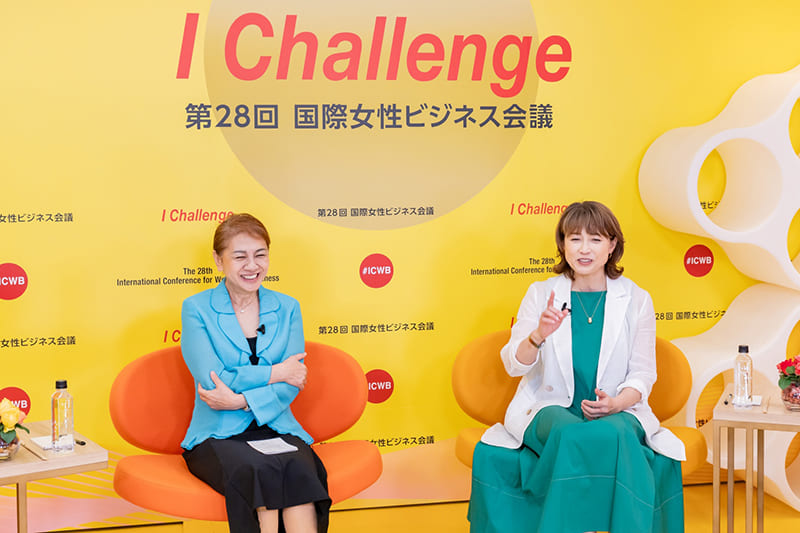
Saving water, adjusting boards
Speeches by three other female speakers followed. Kilimo Chief Operating Officer and co-founder Tatiana Malvasio, from Argentina, gave a presentation about Kilimo’s business of helping farmers save water using artificial intelligence and simultaneously helping companies, including major information technology firms, which use vast quantities of water to cool their servers, achieve their goals of water neutrality by having them purchase the same amount of water as that saved by the farmers.
Shie Lundberg, director of the Corporate Engineering Program Management Office at Google, talked about how to foster team excellence based on her ample experience in leading teams of different sizes and nationalities.
Betsy Berkhemer-Credaire, CEO of 50/50 Women on Boards, talked about the recent progress in the United States regarding gender balance and diversity on corporate boards, and suggested that the simplest and quickest way to achieve an equal percentage of men and women on boards would be to add more seats for women instead of waiting for men to retire or step down.
The president and CEO of NEC Corp., Takayuki Morita, and Sasaki took over the topic of corporate diversity. NEC, a major Japanese IT and electronics company, is the global leader in facial recognition.
“Engaging people from different backgrounds — not limited to women — in a decision-making process is immensely important because talking only with people who share a lot in common will create blind spots, which could be a tremendous risk for a company,” he said. Sasaki agreed, saying: “Engaging women will bring about new perspectives for management. The same is true for having more foreigners around.”
Morita also pointed out that one of the purposes of mergers and acquisitions is to maximize the benefits of diversity. But at the same time, he stressed the importance of having shared rules of communication and decision-making. Sasaki said midcareer recruitment is similar — hiring people who have worked for other companies can bring positive differences. “It will be such a loss if we don’t make the most of whatever they bring with them,” she said.
During an hourlong lunch break, the participants were randomly divided into groups of four or five to enjoy an online networking session, then reshuffled so they could meet and talk with more people.
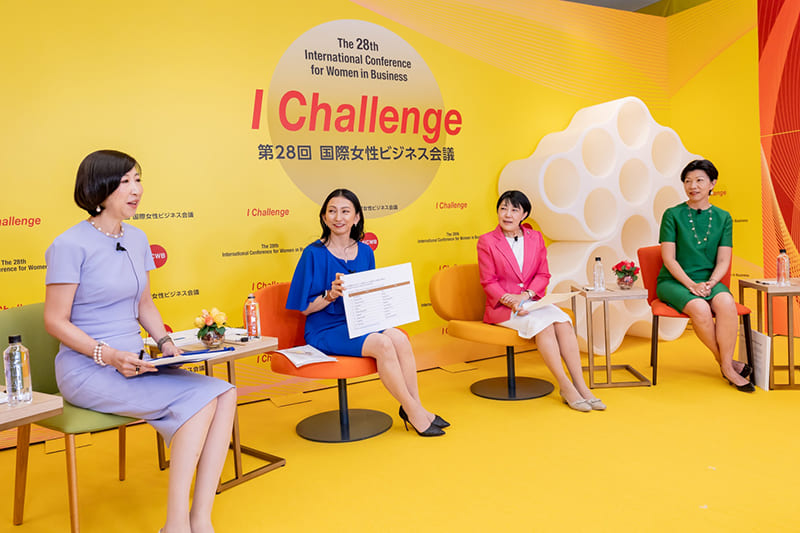
Filling the gender gap
The afternoon session started with a series of speeches from Japanese policymakers followed by four talks by corporate executives, a lawyer, a leader of an international organization, and a sports journalist and athlete.
One of the talks was themed “Women and Profitability.” The discussion was moderated by Asako Aoyama, a senior vice president at NEC, who started the session by sharing some data that showed that “more diverse companies are likely to experience better, higher profitability than the least diverse companies.”
MPower Partners Fund General Partner Kathy Matsui supported this assertion by sharing more data from the United States and Japan. She went on to say that a similar but more extreme phenomenon is happening in Japan’s startup arena. “Although the sample size is small, [of] about 230 companies that did IPOs (initial public offerings) during the years 2020 and 2021, companies founded by women tended to raise 44% less capital than male-founded startups,” Matsui said. “But relative to each yen of capital raised, the average market capitalization at the time of IPO for the female-founded companies was, surprisingly, 32% larger.” She also pointed out that the average amount of sales generated in the IPO year was 20% higher for female-founded companies than male-founded companies. “We may be missing huge opportunities in Japan, particularly in the startup ecosystem,” she said.
LinkedIn Japan Country Manager Wakana Tanaka spoke about the company’s success in rapidly filling an internal gender gap. Only 25% of the leadership roles were held by women at LinkedIn on a global scale in 2016, but now about half of them are held by women, and the annual turnover has grown by 600% in the last five years.
She said that one of the methods used to accelerate the change was to shift to skill-based recruitment. “Disregarding candidates’ experiences and how long they stayed in previous companies and focusing only on skills increased a potential talent pool by 17 times, including eight times more female candidates,” she said.
Tipping point is 20%
Mitsuru Claire Chino, a managing executive officer at Itochu Corp. and an attorney in California, shared data showing that merely increasing the number of women in a company does not automatically result in more innovation. “The data explains that when the percentage of women in managerial positions exceeds 20%, innovations accelerate drastically,” she said. “This proves that the key to improve profitability is to engage diverse talents in decision-making and include their opinions in the management.”
After Moriko Takahashi, a baton twirler at Cirque du Soleil still in her costume from the day’s performance, spoke from a theater in Las Vegas about the challenges she faces as a performer, five roundtable discussions were held in parallel — two in English and three in Japanese.
One of the English discussions was themed “Inspiring Entrepreneurs,” where Hami Kim, the CEO of Kooky, a global entertainment platform, and Sarah Liu, the managing director of The Dream Collective, a global diversity, equity and inclusion consultancy, talked about their experiences as startups.
Both shared a career history of having started their business to solve problems they faced — as an artist struggling to make a living in music in Kim’s case, and as an ambitious marketer confronted by the lack of diversity while climbing up the corporate ladder in Liu’s case.
Kooky now has more than a million monthly active users, providing additional value to both artists and fans by offering them new ways of interaction and changing the conventional music industry in South Korea.
Liu is helping over 140 enterprises and organizations in 18 locations around the world go beyond what she calls the “artificial harmony” of merely going along with the concept of diversity, guiding them to believe and invest in it.
In the Q&A session, Kim and Liu provided concrete answers on where and how entrepreneurs can get the help they want, and the benefits of having the right people around oneself, including a co-founder to reinforce the drive for success.
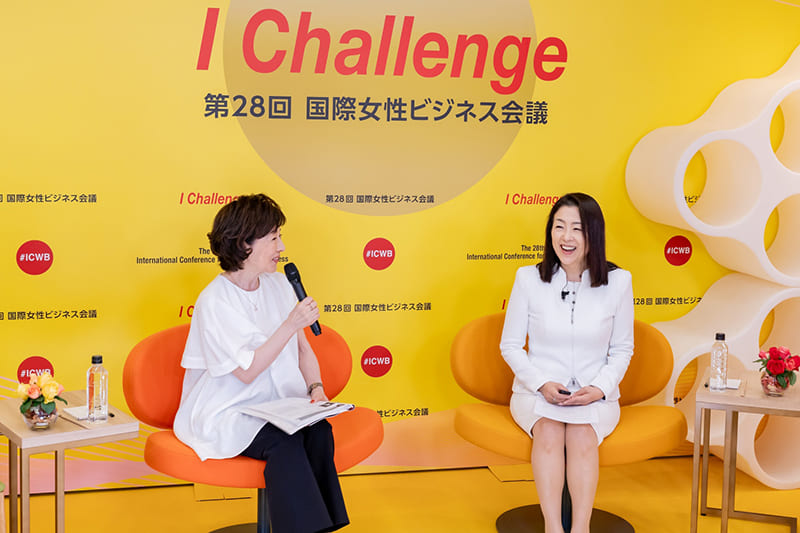
Australia, Nigeria, space
The evening session consisted of more speeches about refugee integration in Australia, a financial technology startup in Nigeria and the life challenges of an astronaut. There was also a talk show by a photographer and the founder and artistic director of the White Hands Chorus Nippon about their endeavor to help hearing-impaired children enjoy playing and listening to music using their hands or looking at performers’ hands.
Closer to the end of the event, Sasaki welcomed to the screen sponsored students and their sponsors, who provided not only financial aid so the students could attend the event but also mentoring. This is called the Matching Sponsor Program, in which students who want to participate in the event submit essays and sponsors make their selections.
The finale of the event was another online networking session — this time divided according to age groups — to share their learning and excitement, followed by a closing message by Masako Mori, special adviser to the prime minister in charge of women’s empowerment and promoting understanding of LGBT, who introduced the government’s new project to support female entrepreneurs.
The online part of the conference ended in a great success, with the wave of enthusiasm in the networking and Q&A sessions felt even to those present only remotely. It generated a sense of connection and fellowship among the participants, who thought about the theme “I Challenge” throughout the day and came up with diverse answers on personal goals they were setting for themselves to be part of the drive to achieve better results through diversity.
The second part of the conference, consisting of five talk shows and a networking party, will be held at the Grand Nikko Tokyo Daiba on Aug. 27.
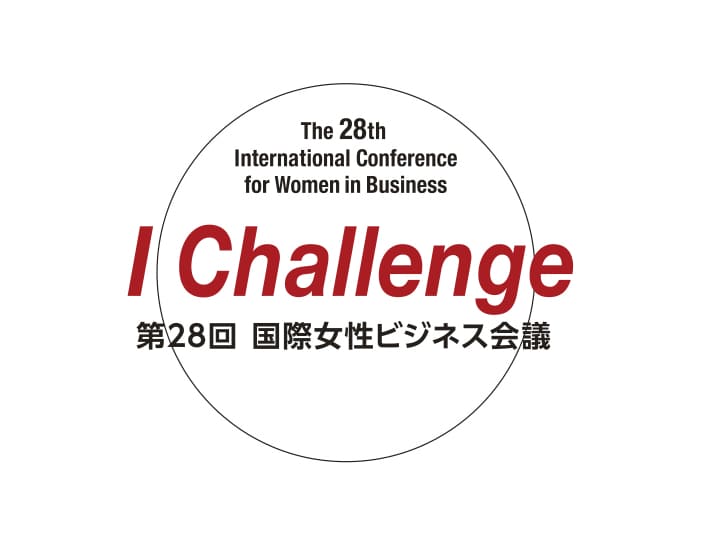
Aiming to highlight issues related to a sustainable society, The Japan Times gave its support to this event by becoming a media sponsor.

